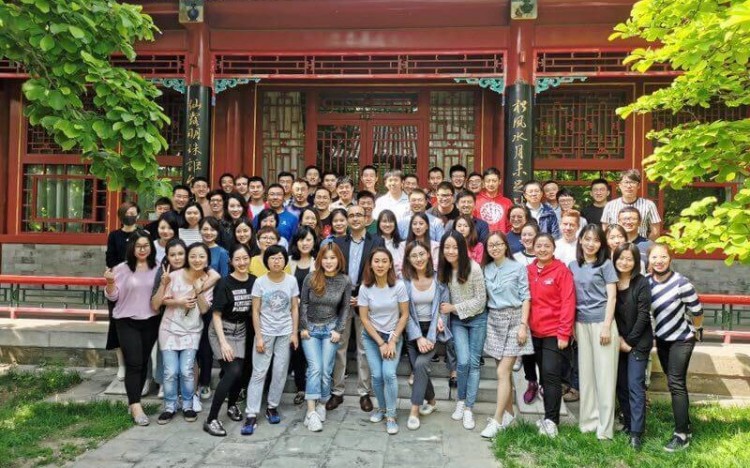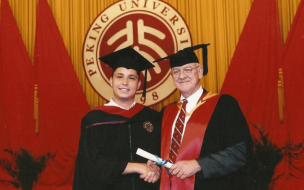By adopting the language and culture, he was given access to a country normally closed to foreigners at the time. Forming friendships with people from another race and religion played a key part in his ability to establish a mutual comprehension between East and West.
Now, those relations are being built by business, as China’s place on the world stage is consolidated. It’s what attracted Antoni Radziwill—who says Matteo Ricci is his “little hero”—to the Peking University-UCL (PKU-UCL) MBA program, and the chance to study an MBA degree in two countries.
The program is delivered between Peking University, in Beijing, and UCL, London. Antoni adds he was also inspired by his uncle, who studied an MBA delivered between the Universities of Warsaw and Illinois, respectively.
Studying an MBA degree in two countries, Antoni says, gives you more opportunities when you graduate.
“If I stay in China for the next 10 years or so, or go to Europe, I can show my experience here and there,” he explains.
“I have double the opportunities, and the value of an MBA and this kind of program is really worth it.”
Becoming an international entrepreneur
Antoni has leveraged the PKU-UCL MBA program to launch his own company, ChinyTech.pl, which translates from Antoni’s native Polish as China Tech.
Like Matteo Ricci, he wants to bridge the gap between the East and the West, by focusing on building business relations and educating people in Europe on the benefits of doing business with China. He also wants to teach foreigners how to get a feel of the Chinese way of life, and to show them how to leverage the vast tech sphere emanating from the country.
“My idea of this platform […] is to introduce some of the ideas of the tech industry in China [to Europe]. China is the main profile but I’m also taking some Asian countries to show [them] how tech can change their business.”
The venture is the largest analytical platform in Poland dealing with the development of modern technology, science, and innovation between Poland, China, and other Asian nations. The PKU-UCL MBA gave Antoni the necessary knowledge of business in both the East and the West. Modules on entrepreneurship in Europe and China, China in a global context, and cross-cultural management and negotiation, all prepared him to succeed after graduating.
An MBA does so much more though, he explains, going on to say that being in the MBA classroom is like a heavy fog lifting. Afterwards, Antoni was able to organize his thoughts more clearly, and he says he no longer has a “big mess” in his head when it comes to business.
Why study an MBA in China?
When Antoni (pictured) arrived in China for the first time on a language scholarship—pre-MBA—he says he saw how different everything was to what he’d been used to.
“The market was huge,” he explains. “Then I realized that, in five, 10, or 20 years all business round the world would be connected to China somehow.
When you’re living here and can feel what is happening and what impact China is having on whole world you want to be part of it.”
It’s not without its challenges though, and Antoni advises incoming international MBA students to China to be humble, patient, and to think long-term.
“When you cross this limit, and stay longer than three years, you understand this culture, and that business is more about relations—these little things help you to live here.”
Professor Yao, dean of the National School of Development (NSD) at Peking University, agrees. He says that understanding the Chinese way of life is a key trait for any successful international MBA.
“They probably need some time to adapt to the food in China, to the service style,” he explains. “Another challenge is for students to understand the Chinese political system, [especially] for students who don’t have some background information.”
Why is now the time to study an MBA in China?
The benefits for internationals abound, adds Prof. Yao.
“The Chinese economy is becoming more and more influential in the world economy,” he says.
“I understand many Chinese companies are beginning to hire foreign workers. That can be a good opportunity for international students to find a good job in China.”
Now is the time to study an MBA in China because of the country’s commitment to becoming a leading nation in an array of industries—a strategy known as Made in China 2025.
The newly revamped Belt and Road Initiative (BRI) is also rife for job opportunities, as Prof. Yao explains China’s efforts to reach out to BRI countries and extend relations from that into Europe.
“Europe to a large extent needs the world market,” he adds. “Students from Europe can tap into market potentials in China.
“The PKU-UCL MBA program is one of the deep collaborations between China and the UK in the field of education, so that really excites me—the University encourages us to recruit more international students, so there is a good opportunity there for students from Europe.”








